Tunisia national football team facts for kids
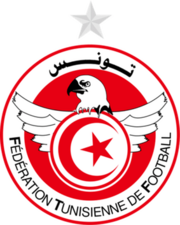 |
|||||||||||||||||||||||||||||||||||||||||||||||||||||||||||||||||||||||
| Nickname(s) | نسور قرطاج (Eagles of Carthage) |
||||||||||||||||||||||||||||||||||||||||||||||||||||||||||||||||||||||
|---|---|---|---|---|---|---|---|---|---|---|---|---|---|---|---|---|---|---|---|---|---|---|---|---|---|---|---|---|---|---|---|---|---|---|---|---|---|---|---|---|---|---|---|---|---|---|---|---|---|---|---|---|---|---|---|---|---|---|---|---|---|---|---|---|---|---|---|---|---|---|---|
| Association | Tunisian Football Federation | ||||||||||||||||||||||||||||||||||||||||||||||||||||||||||||||||||||||
| Other affiliation | UAFA (Arab World) | ||||||||||||||||||||||||||||||||||||||||||||||||||||||||||||||||||||||
| Confederation | CAF (Africa) | ||||||||||||||||||||||||||||||||||||||||||||||||||||||||||||||||||||||
| Sub-confederation | UNAF (North Africa) | ||||||||||||||||||||||||||||||||||||||||||||||||||||||||||||||||||||||
| Head coach | Sami Trabelsi | ||||||||||||||||||||||||||||||||||||||||||||||||||||||||||||||||||||||
| Captain | Youssef Msakni | ||||||||||||||||||||||||||||||||||||||||||||||||||||||||||||||||||||||
| Most caps | Radhi Jaïdi (105) | ||||||||||||||||||||||||||||||||||||||||||||||||||||||||||||||||||||||
| Top scorer | Issam Jemâa (36) | ||||||||||||||||||||||||||||||||||||||||||||||||||||||||||||||||||||||
| Home stadium | Hammadi Agrebi Stadium | ||||||||||||||||||||||||||||||||||||||||||||||||||||||||||||||||||||||
| FIFA code | TUN | ||||||||||||||||||||||||||||||||||||||||||||||||||||||||||||||||||||||
|
|||||||||||||||||||||||||||||||||||||||||||||||||||||||||||||||||||||||
| FIFA ranking | |||||||||||||||||||||||||||||||||||||||||||||||||||||||||||||||||||||||
| Current | 28 |
||||||||||||||||||||||||||||||||||||||||||||||||||||||||||||||||||||||
| Highest | 14 (April – May 2018) | ||||||||||||||||||||||||||||||||||||||||||||||||||||||||||||||||||||||
| Lowest | 65 (July 2010) | ||||||||||||||||||||||||||||||||||||||||||||||||||||||||||||||||||||||
| First international | |||||||||||||||||||||||||||||||||||||||||||||||||||||||||||||||||||||||
(Tunis, Tunisia; 2 June 1957) |
|||||||||||||||||||||||||||||||||||||||||||||||||||||||||||||||||||||||
| Biggest win | |||||||||||||||||||||||||||||||||||||||||||||||||||||||||||||||||||||||
(Rome, Italy; 18 August 1960) (Tunis, Tunisia; 7 January 2000) (Tunis, Tunisia; 26 March 2005) (Tunis, Tunisia; 12 June 2015) |
|||||||||||||||||||||||||||||||||||||||||||||||||||||||||||||||||||||||
| Biggest defeat | |||||||||||||||||||||||||||||||||||||||||||||||||||||||||||||||||||||||
(Budapest, Hungary; 24 July 1960) |
|||||||||||||||||||||||||||||||||||||||||||||||||||||||||||||||||||||||
| World Cup | |||||||||||||||||||||||||||||||||||||||||||||||||||||||||||||||||||||||
| Appearances | 6 (first in 1978) | ||||||||||||||||||||||||||||||||||||||||||||||||||||||||||||||||||||||
| Best result | Group stage (1978, 1998, 2002, 2006, 2018, 2022) | ||||||||||||||||||||||||||||||||||||||||||||||||||||||||||||||||||||||
| Africa Cup of Nations | |||||||||||||||||||||||||||||||||||||||||||||||||||||||||||||||||||||||
| Appearances | 22 (first in 1962) | ||||||||||||||||||||||||||||||||||||||||||||||||||||||||||||||||||||||
| Best result | Champions (2004) | ||||||||||||||||||||||||||||||||||||||||||||||||||||||||||||||||||||||
| African Nations Championship | |||||||||||||||||||||||||||||||||||||||||||||||||||||||||||||||||||||||
| Appearances | 2 (first in 2011) | ||||||||||||||||||||||||||||||||||||||||||||||||||||||||||||||||||||||
| Best result | Champions (2011) | ||||||||||||||||||||||||||||||||||||||||||||||||||||||||||||||||||||||
| Arab Cup | |||||||||||||||||||||||||||||||||||||||||||||||||||||||||||||||||||||||
| Appearances | 4 (first in 1963) | ||||||||||||||||||||||||||||||||||||||||||||||||||||||||||||||||||||||
| Best result | Champions (1963) | ||||||||||||||||||||||||||||||||||||||||||||||||||||||||||||||||||||||
| Confederations Cup | |||||||||||||||||||||||||||||||||||||||||||||||||||||||||||||||||||||||
| Appearances | 1 (first in 2005) | ||||||||||||||||||||||||||||||||||||||||||||||||||||||||||||||||||||||
| Best result | Group stage (2005) | ||||||||||||||||||||||||||||||||||||||||||||||||||||||||||||||||||||||
|
Medal record
|
|||||||||||||||||||||||||||||||||||||||||||||||||||||||||||||||||||||||
| Website | (in French) | ||||||||||||||||||||||||||||||||||||||||||||||||||||||||||||||||||||||
The Tunisia national football team represents Tunisia in international football games for men. The team is managed by the Tunisian Football Federation (TFF). They play in Africa under the Confederation of African Football (CAF) and globally with FIFA. They are also part of the UNAF and the Union of Arab Football Associations (UAFA).
Fans and media often call the team the Eagles of Carthage, and their symbol is the bald eagle. Their home uniform is mostly white, and their away uniform is red, matching the national flag. The team has played in the FIFA World Cup six times and the Africa Cup of Nations twenty-two times. They have also competed in the Summer Olympics four times and the FIFA Confederation Cup once. Since 2001, their main home stadium has been the Hammadi Agrebi Stadium in Radès, Tunis.
Tunisia's first game after gaining independence was against Libya, which they won 4–2. The team has had strong periods of playing at the highest international level, especially from 1962 to 1978, 1994 to 2008, and again from 2014 onwards. They first qualified for the FIFA World Cup in 1978. They made history by becoming the first African and Arab team to win a World Cup match, beating Mexico 3–1. Tunisia has qualified for the World Cup six times in total but has not yet made it past the group stage.
The team has played in the Africa Cup of Nations 22 times, starting in 1962. They won their only title in 2004 when they hosted the event, defeating Morocco in the final. As African champions, they played in the 2005 FIFA Confederations Cup but were eliminated in the group stage. Tunisia has also won the African Nations Championship in 2011 and the FIFA Arab Cup in 1963.
Radhi Jaïdi has played the most games for the Tunisian national team, with 105 matches. Issam Jemâa is their top scorer with 36 goals. The team's highest FIFA Men's World Ranking was 14th in April and May 2018. Their lowest rank was 65th in July 2010. Tunisia holds the record for the most consecutive appearances in the Africa Cup of Nations, with 17 straight tournaments from 1994 to 2025.
Contents
Team History
Early Years (1928–1956)
Before Tunisia became independent, an unofficial football team was formed in 1928. It included the best Tunisian players from the local league. Their first game was on March 11, 1928, against the France national football B team, which Tunisia lost 8–2. They also lost their next friendly matches against the same team.
Tunisia got its first win in 1932, beating French Algeria 1–0. Most of their games in the 1930s and 1940s were against French teams. Many of these matches took place at the Stade Vélodrome in Tunis.
After Independence (1956–1962)
Tunisia became independent from France on March 20, 1956. The Tunisian Football Federation was created in 1957. Tunisia's first game as an independent nation was against Algeria on June 1, 1957, which they lost 2–1.
They played their first official tournament at the 1957 Arab Games. They won against Libya 4–3, with Brahim Ben Miled scoring Tunisia's first official goal. They also beat Iraq and Lebanon before losing to Syria in the final. In 1960, Milan Kristić became the team's first foreign coach. Tunisia qualified for the 1960 Summer Olympics, their first big international event, after beating teams like Malta and Morocco.
Golden Era and First World Cup (1962–1978)
In 1962, Tunisia joined the African Cup of Nations qualifiers for the first time. They qualified and finished third in the tournament. The team won the 1963 Arab Cup by beating Syria, Jordan, Lebanon, and Kuwait.
Tunisia hosted the 1965 Africa Cup of Nations and reached the final, but lost 3–2 to Ghana in extra time. In 1973, they won the 1973 Palestine Cup of Nations, winning all six of their matches and scoring 19 goals. In 1975, Abdelmajid Chetali became the coach. Tunisia then qualified for their first FIFA World Cup in 1978. They famously beat Mexico 3–1, drew with West Germany, and lost to Poland.
Challenges and Comeback (1978–2014)
After their first World Cup, Tunisia faced some tough times. Between 1980 and 1992, they only qualified for two major tournaments: the 1982 African Cup of Nations and the 1988 Summer Olympics, getting knocked out early in both. They almost made it to the 1986 World Cup, but lost to Algeria.
In 1994, Tunisia hosted the 1994 African Cup of Nations but finished last in their group. This led to a new start for the team.
New Beginnings and World Cup Returns (1994–2022)
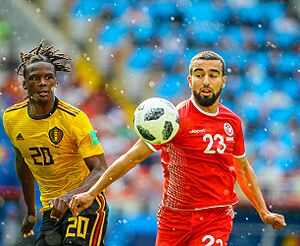
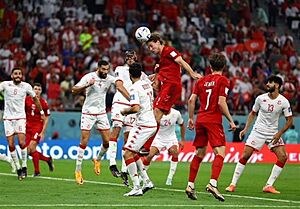
Henryk Kasperczak became the new coach in 1994. Tunisia reached the final of the 1996 African Cup of Nations, but lost to host South Africa. They also qualified for the 1998 World Cup after 20 years, but again did not pass the group stage.
In 2002, Roger Lemerre became the coach. Tunisia hosted and won the 2004 African Cup of Nations, beating Morocco in the final. This was their first African Cup of Nations title! Lemerre became the first coach to win two different continental tournaments, having won Euro 2000 with France before. As champions, Tunisia played in the 2005 FIFA Confederations Cup in Germany. They won one game against Australia but were eliminated. Tunisia also qualified for the 2006 FIFA World Cup, drawing one game and losing two.
After some coaching changes, Sami Trabelsi led the team to win the 2011 African Nations Championship. In 2017, Nabil Maâloul returned as coach and successfully led Tunisia to the 2018 World Cup in Russia. Their strong performance in friendlies helped them reach their highest-ever FIFA ranking of 14th. In the World Cup, they were eliminated in the group stage, but they did win their last game against Panama 2–1.
Under new coach Alain Giresse, Tunisia reached the semi-finals of the 2019 Africa Cup of Nations for the first time in 15 years. In 2021, Tunisia reached the final of the 2021 FIFA Arab Cup but lost to Algeria.
In early 2022, Tunisia played in the 2021 Africa Cup of Nations. They had a tough group stage but managed to beat Nigeria in the Round of 16 before being eliminated by Burkina Faso. In March 2022, Tunisia qualified for their sixth World Cup, the 2022 tournament in Qatar. They won the 2022 Kirin Cup Soccer title before the World Cup. In the 2022 World Cup, Tunisia drew with Denmark and lost to Australia. They then famously beat world champions France 1–0, but it was not enough to move past the group stage.
Recent Challenges (2023–Present)
After the 2022 World Cup, the team faced some difficulties. They qualified for the 2023 Africa Cup of Nations. However, their performances declined, especially after issues with the Tunisian Football Federation's president.
In the 2024 FIFA Series friendly tournament, Tunisia finished third. They continued their 2026 FIFA World Cup qualification matches, winning against Equatorial Guinea and drawing with Namibia. On July 1, 2024, Faouzi Benzarti was appointed coach for the fourth time. Under his leadership, the team started the 2025 Africa Cup of Nations qualification with two wins. However, after some mixed results, Benzarti resigned. His assistant, Kais Yaâkoubi, took over temporarily. Tunisia qualified for the final tournament with some difficulty. On February 10, 2025, the federation announced that Sami Trabelsi would return as the team's coach. His first big challenge was in the World Cup qualifiers, where Tunisia secured two victories against Liberia and Malawi.
Home Stadium
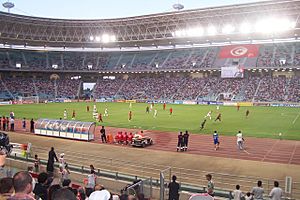
From 1956 to 1967, Tunisia's main stadium was Chedly Zouiten Stadium. It hosted the Africa Cup of Nations in 1965 and 1994. Then, the El Menzah Stadium became the national stadium in 1967.
In 2001, the Hammadi Agrebi Stadium was opened in Radès, Tunis. This stadium can hold 60,000 people. Tunisia has used this stadium for almost all their important home games, including the 2004 African Cup of Nations final. The team also sometimes plays matches at the Mustapha Ben Jannet Stadium in Monastir, which holds 20,000 fans. Other stadiums like the Sousse Olympic Stadium also host games.
Team Rivalries
Tunisia has strong football rivalries with its neighbors: Algeria, Morocco, and Egypt. These countries share close cultural ties.
Tunisia has played 45 games against Algeria. They have met in World Cup qualifiers several times. Algeria has a slight lead in wins. In official tournaments like the Africa Cup of Nations, Tunisia has won twice against Algeria, while Algeria won their FIFA Arab Cup match.
Tunisia and Egypt have played 39 times. Tunisia has won 16 matches, Egypt 12, and 11 games ended in a draw.
Tunisia and Morocco have played 50 games since 1956. They have met in many World Cup qualifiers and four times in the Africa Cup of Nations. Tunisia won two of their AFCON matches against Morocco, including the 2004 final.
Team Image
Media Coverage
Tunisian Television has shown the national team's matches since Tunisia became independent. Today, BeIN Sports broadcasts the team's games during big international events like the Africa Cup of Nations and the FIFA World Cup in the Middle East and North Africa. Issam Chaouali is a well-known commentator for Tunisia's matches.
Kit Sponsors
The team's uniform supplier has changed over the years. They have used brands like Adidas, Kappa, Lotto, Uhlsport, Puma, and Burrda Sport. Since 2018, Kappa has been their kit supplier.
Current Team Status
2026 FIFA World Cup Qualification
| Pos | Team | Pld | W | D | L | GF | GA | GD | Pts |
|---|
Rules for classification: Tiebreakers
2025 FIFA Arab Cup
| Pos | Team | Pld | W | D | L | GF | GA | GD | Pts |
|---|
2025 Africa Cup of Nations
| Pos | Team | Pld | W | D | L | GF | GA | GD | Pts | Qualification |
|---|---|---|---|---|---|---|---|---|---|---|
| 1 | 0 | 0 | 0 | 0 | 0 | 0 | 0 | 0 | Advance to knockout stage | |
| 2 | 0 | 0 | 0 | 0 | 0 | 0 | 0 | 0 | ||
| 3 | 0 | 0 | 0 | 0 | 0 | 0 | 0 | 0 | Possible knockout stage based on ranking | |
| 4 | 0 | 0 | 0 | 0 | 0 | 0 | 0 | 0 |
Current Staff
Coaching History
- Interim coaches are listed in italics.

 Rachid Turki (1956–1957)
Rachid Turki (1956–1957) Draoua,
Draoua,  Cherif,
Cherif,  Soudani (1957–1960)
Soudani (1957–1960) Milan Kristić (1960–1961)
Milan Kristić (1960–1961) Frane Matošić (1961–1962)
Frane Matošić (1961–1962) André Gérard (1963–1965)
André Gérard (1963–1965) Mokhtar Ben Nacef (1965–1968)
Mokhtar Ben Nacef (1965–1968) Radojica Radojičić (1968–1969)
Radojica Radojičić (1968–1969) Sereta Begović (1969)
Sereta Begović (1969) Hameur Hizem (1970–1974) (1)
Hameur Hizem (1970–1974) (1) Andrej Prean Nagy (1974–1975)
Andrej Prean Nagy (1974–1975) Abdelmajid Chetali (1975–1978)
Abdelmajid Chetali (1975–1978) Hameur Hizem (1978–1979) (2)
Hameur Hizem (1978–1979) (2) Ahmed Dhib (1979–1980)
Ahmed Dhib (1979–1980) Ryszard Kulesza (1981–1983)
Ryszard Kulesza (1981–1983) Youssef Zouaoui (1984–1986) (1)
Youssef Zouaoui (1984–1986) (1) Jean Vincent (1986–1987)
Jean Vincent (1986–1987) Taoufik Ben Othman (1987–1988)
Taoufik Ben Othman (1987–1988) Antoni Piechniczek (1988) (1)
Antoni Piechniczek (1988) (1) Mokhtar Tlili (1988–1989)
Mokhtar Tlili (1988–1989) Antoni Piechniczek (1989) (2)
Antoni Piechniczek (1989) (2) Mrad Mahjoub (1990–1993)
Mrad Mahjoub (1990–1993) Youssef Zouaoui (1993–1994) (2)
Youssef Zouaoui (1993–1994) (2) Faouzi Benzarti (1994) (1)
Faouzi Benzarti (1994) (1) Henryk Kasperczak (1994–1998) (1)
Henryk Kasperczak (1994–1998) (1) Franco Scoglio (1998–2001)
Franco Scoglio (1998–2001) Eckhard Krautzun (2001)
Eckhard Krautzun (2001) Henri Michel (2001–2002)
Henri Michel (2001–2002) Ammar Souayah (2002)
Ammar Souayah (2002) Roger Lemerre (2002–2008)
Roger Lemerre (2002–2008) Humberto Coelho (2008–2009)
Humberto Coelho (2008–2009) Faouzi Benzarti (2009–2010) (2)
Faouzi Benzarti (2009–2010) (2) Bertrand Marchand (2010)
Bertrand Marchand (2010) Sami Trabelsi (2010–2013)
Sami Trabelsi (2010–2013) Nabil Maâloul (2013) (1)
Nabil Maâloul (2013) (1) Ruud Krol (2013)
Ruud Krol (2013) Nizar Khanfir (2014)
Nizar Khanfir (2014) Georges Leekens (2014–2015)
Georges Leekens (2014–2015) Henryk Kasperczak (2015–2017) (2)
Henryk Kasperczak (2015–2017) (2) Nabil Maâloul (2017–2018) (2)
Nabil Maâloul (2017–2018) (2) Faouzi Benzarti (2018) (3)
Faouzi Benzarti (2018) (3) Maher Kanzari (2018)
Maher Kanzari (2018) Alain Giresse (2018–2019)
Alain Giresse (2018–2019) Mondher Kebaier (2019–2022)
Mondher Kebaier (2019–2022) Jalel Kadri (2022–2024)
Jalel Kadri (2022–2024) Montasser Louhichi (2024)
Montasser Louhichi (2024) Faouzi Benzarti (2024) (4)
Faouzi Benzarti (2024) (4) Kais Yaâkoubi (2024)
Kais Yaâkoubi (2024) Sami Trabelsi (2025–present) (2)
Sami Trabelsi (2025–present) (2)
Players
Current Squad
The following players were called up for the friendly matches against Burkina Faso, Morocco and Zambia, on June 2, 6 and 10, 2025.
Caps and goals are correct as of June 2, 2025, after the match against Morocco.
| No. | Pos. | Player | Date of birth (age) | Caps | Goals | Club |
|---|---|---|---|---|---|---|
| 1 | GK | Sami Helal | 19 October 1988 | 0 | 0 | |
| 16 | GK | Aymen Dahmen | 28 January 1997 | 23 | 0 | |
| 22 | GK | Abdessalem Hallaoui | 28 March 1989 | 0 | 0 | |
| 28 | GK | Noureddine Farhati | 14 September 2000 | 0 | 0 | |
|
|
||||||
| 2 | DF | Ali Abdi | 20 December 1993 | 36 | 4 | |
| 3 | DF | Montassar Talbi | 26 May 1998 | 51 | 2 | |
| 4 | DF | Mahmoud Ghorbel | 31 December 2003 | 3 | 0 | |
| 5 | DF | Marouane Sahraoui | 9 January 1996 | 0 | 0 | |
| 6 | DF | Dylan Bronn | 19 June 1995 | 42 | 2 | |
| 12 | DF | Mortadha Ben Ouanes | 2 July 1994 | 11 | 0 | |
| 18 | DF | Alaa Ghram | 24 July 2001 | 6 | 0 | |
| 20 | DF | Yan Valery | 22 February 1999 | 10 | 0 | |
| 21 | DF | Houssem Hassen Romdhane | 21 February 2000 | 0 | 0 | |
| 24 | DF | Amin Cherni | 7 July 2001 | 3 | 0 | |
|
|
||||||
| 8 | MF | Anis Ben Slimane | 16 March 2001 | 39 | 4 | |
| 10 | MF | Hannibal Mejbri | 21 January 2003 | 33 | 0 | |
| 13 | MF | Ferjani Sassi (captain) | 18 March 1992 | 88 | 7 | |
| 14 | MF | Aïssa Laïdouni | 13 December 1996 | 56 | 2 | |
| 15 | MF | Moez Hadj Ali | 9 August 1999 | 1 | 0 | |
|
|
||||||
| 7 | FW | Elias Achouri | 10 February 1999 | 20 | 2 | |
| 9 | FW | Hazem Mastouri | 18 June 1997 | 6 | 2 | |
| 11 | FW | Firas Chaouat | 8 May 1996 | 14 | 2 | |
| 17 | FW | Hamza Khadraoui | 16 January 1999 | 2 | 0 | |
| 19 | FW | Firas Ben Larbi | 27 May 1996 | 15 | 3 | |
| 23 | FW | Sayfallah Ltaief | 12 April 2000 | 20 | 1 | |
| 25 | FW | Youssef Snana | 24 March 2004 | 1 | 0 | |
| 26 | FW | Sebastian Tounekti | 13 July 2002 | 2 | 0 | |
| 27 | FW | Khalil Ayari | 2 February 2005 | 0 | 0 | |
Recent Call-ups
The following players have been called up within the last twelve months.
| Pos. | Player | Date of birth (age) | Caps | Goals | Club | Latest call-up | |||||||||||||||||||||||||||||||||||||||||||||||||||||||||||||||||||||||||||||||||||||||||||||||||||||||||||||||||||||||||||||||||||||||||||||||||||||||||||||||||||||||||||||||||||||||||||||||||||||||||||||||||||||||||||||||||||||||||||||||||||||||||||||||||||||||||||||||||||||||||||||||||||||||||||||||||||||||||||||||||||||||||||||||||||||||||||||||||||||||||||||||||||||||||
|---|---|---|---|---|---|---|---|---|---|---|---|---|---|---|---|---|---|---|---|---|---|---|---|---|---|---|---|---|---|---|---|---|---|---|---|---|---|---|---|---|---|---|---|---|---|---|---|---|---|---|---|---|---|---|---|---|---|---|---|---|---|---|---|---|---|---|---|---|---|---|---|---|---|---|---|---|---|---|---|---|---|---|---|---|---|---|---|---|---|---|---|---|---|---|---|---|---|---|---|---|---|---|---|---|---|---|---|---|---|---|---|---|---|---|---|---|---|---|---|---|---|---|---|---|---|---|---|---|---|---|---|---|---|---|---|---|---|---|---|---|---|---|---|---|---|---|---|---|---|---|---|---|---|---|---|---|---|---|---|---|---|---|---|---|---|---|---|---|---|---|---|---|---|---|---|---|---|---|---|---|---|---|---|---|---|---|---|---|---|---|---|---|---|---|---|---|---|---|---|---|---|---|---|---|---|---|---|---|---|---|---|---|---|---|---|---|---|---|---|---|---|---|---|---|---|---|---|---|---|---|---|---|---|---|---|---|---|---|---|---|---|---|---|---|---|---|---|---|---|---|---|---|---|---|---|---|---|---|---|---|---|---|---|---|---|---|---|---|---|---|---|---|---|---|---|---|---|---|---|---|---|---|---|---|---|---|---|---|---|---|---|---|---|---|---|---|---|---|---|---|---|---|---|---|---|---|---|---|---|---|---|---|---|---|---|---|---|---|---|---|---|---|---|---|---|---|---|---|---|---|---|---|---|---|---|---|---|---|---|---|---|---|---|---|---|---|---|---|---|---|---|---|---|---|---|---|---|---|---|---|---|---|---|---|---|---|---|---|---|---|---|---|---|---|---|---|---|---|---|---|---|---|---|
| GK | Moez Ben Cherifia | 24 June 1991 | 21 | 0 | v. |
||||||||||||||||||||||||||||||||||||||||||||||||||||||||||||||||||||||||||||||||||||||||||||||||||||||||||||||||||||||||||||||||||||||||||||||||||||||||||||||||||||||||||||||||||||||||||||||||||||||||||||||||||||||||||||||||||||||||||||||||||||||||||||||||||||||||||||||||||||||||||||||||||||||||||||||||||||||||||||||||||||||||||||||||||||||||||||||||||||||||||||||||||||||||||
| GK | Amenallah Memmiche | 20 April 2004 | 5 | 0 | v. |
||||||||||||||||||||||||||||||||||||||||||||||||||||||||||||||||||||||||||||||||||||||||||||||||||||||||||||||||||||||||||||||||||||||||||||||||||||||||||||||||||||||||||||||||||||||||||||||||||||||||||||||||||||||||||||||||||||||||||||||||||||||||||||||||||||||||||||||||||||||||||||||||||||||||||||||||||||||||||||||||||||||||||||||||||||||||||||||||||||||||||||||||||||||||||
| GK | Bechir Ben Saïd | 29 November 1994 | 21 | 0 | v. |
||||||||||||||||||||||||||||||||||||||||||||||||||||||||||||||||||||||||||||||||||||||||||||||||||||||||||||||||||||||||||||||||||||||||||||||||||||||||||||||||||||||||||||||||||||||||||||||||||||||||||||||||||||||||||||||||||||||||||||||||||||||||||||||||||||||||||||||||||||||||||||||||||||||||||||||||||||||||||||||||||||||||||||||||||||||||||||||||||||||||||||||||||||||||||
|
|
|||||||||||||||||||||||||||||||||||||||||||||||||||||||||||||||||||||||||||||||||||||||||||||||||||||||||||||||||||||||||||||||||||||||||||||||||||||||||||||||||||||||||||||||||||||||||||||||||||||||||||||||||||||||||||||||||||||||||||||||||||||||||||||||||||||||||||||||||||||||||||||||||||||||||||||||||||||||||||||||||||||||||||||||||||||||||||||||||||||||||||||||||||||||||||||||
| DF | Nader Ghandri | 18 February 1995 | 19 | 0 | v. |
||||||||||||||||||||||||||||||||||||||||||||||||||||||||||||||||||||||||||||||||||||||||||||||||||||||||||||||||||||||||||||||||||||||||||||||||||||||||||||||||||||||||||||||||||||||||||||||||||||||||||||||||||||||||||||||||||||||||||||||||||||||||||||||||||||||||||||||||||||||||||||||||||||||||||||||||||||||||||||||||||||||||||||||||||||||||||||||||||||||||||||||||||||||||||
| DF | Hamza Ben Abda | 14 March 1995 | 0 | 0 | v. |
||||||||||||||||||||||||||||||||||||||||||||||||||||||||||||||||||||||||||||||||||||||||||||||||||||||||||||||||||||||||||||||||||||||||||||||||||||||||||||||||||||||||||||||||||||||||||||||||||||||||||||||||||||||||||||||||||||||||||||||||||||||||||||||||||||||||||||||||||||||||||||||||||||||||||||||||||||||||||||||||||||||||||||||||||||||||||||||||||||||||||||||||||||||||||
| DF | Yassine Meriah | 2 July 1993 | 87 | 5 | v. |
||||||||||||||||||||||||||||||||||||||||||||||||||||||||||||||||||||||||||||||||||||||||||||||||||||||||||||||||||||||||||||||||||||||||||||||||||||||||||||||||||||||||||||||||||||||||||||||||||||||||||||||||||||||||||||||||||||||||||||||||||||||||||||||||||||||||||||||||||||||||||||||||||||||||||||||||||||||||||||||||||||||||||||||||||||||||||||||||||||||||||||||||||||||||||
| DF | Hamza Mathlouthi | 25 July 1992 | 40 | 1 | v. |
||||||||||||||||||||||||||||||||||||||||||||||||||||||||||||||||||||||||||||||||||||||||||||||||||||||||||||||||||||||||||||||||||||||||||||||||||||||||||||||||||||||||||||||||||||||||||||||||||||||||||||||||||||||||||||||||||||||||||||||||||||||||||||||||||||||||||||||||||||||||||||||||||||||||||||||||||||||||||||||||||||||||||||||||||||||||||||||||||||||||||||||||||||||||||
| DF | Wajdi Kechrida | 5 November 1995 | 39 | 0 | v. |
||||||||||||||||||||||||||||||||||||||||||||||||||||||||||||||||||||||||||||||||||||||||||||||||||||||||||||||||||||||||||||||||||||||||||||||||||||||||||||||||||||||||||||||||||||||||||||||||||||||||||||||||||||||||||||||||||||||||||||||||||||||||||||||||||||||||||||||||||||||||||||||||||||||||||||||||||||||||||||||||||||||||||||||||||||||||||||||||||||||||||||||||||||||||||
| DF | Oussama Haddadi | 28 January 1992 | 32 | 0 | v. |
||||||||||||||||||||||||||||||||||||||||||||||||||||||||||||||||||||||||||||||||||||||||||||||||||||||||||||||||||||||||||||||||||||||||||||||||||||||||||||||||||||||||||||||||||||||||||||||||||||||||||||||||||||||||||||||||||||||||||||||||||||||||||||||||||||||||||||||||||||||||||||||||||||||||||||||||||||||||||||||||||||||||||||||||||||||||||||||||||||||||||||||||||||||||||
|
|
|||||||||||||||||||||||||||||||||||||||||||||||||||||||||||||||||||||||||||||||||||||||||||||||||||||||||||||||||||||||||||||||||||||||||||||||||||||||||||||||||||||||||||||||||||||||||||||||||||||||||||||||||||||||||||||||||||||||||||||||||||||||||||||||||||||||||||||||||||||||||||||||||||||||||||||||||||||||||||||||||||||||||||||||||||||||||||||||||||||||||||||||||||||||||||||||
| MF | Mohamed Ali Ben Romdhane | 6 September 1999 | 46 | 3 | v. |
||||||||||||||||||||||||||||||||||||||||||||||||||||||||||||||||||||||||||||||||||||||||||||||||||||||||||||||||||||||||||||||||||||||||||||||||||||||||||||||||||||||||||||||||||||||||||||||||||||||||||||||||||||||||||||||||||||||||||||||||||||||||||||||||||||||||||||||||||||||||||||||||||||||||||||||||||||||||||||||||||||||||||||||||||||||||||||||||||||||||||||||||||||||||||
| MF | Anis Ben Slimane | 16 March 2001 | 36 | 4 | v. |
||||||||||||||||||||||||||||||||||||||||||||||||||||||||||||||||||||||||||||||||||||||||||||||||||||||||||||||||||||||||||||||||||||||||||||||||||||||||||||||||||||||||||||||||||||||||||||||||||||||||||||||||||||||||||||||||||||||||||||||||||||||||||||||||||||||||||||||||||||||||||||||||||||||||||||||||||||||||||||||||||||||||||||||||||||||||||||||||||||||||||||||||||||||||||
| MF | Youssef Msakni | 28 October 1990 | 104 | 23 | v. |
||||||||||||||||||||||||||||||||||||||||||||||||||||||||||||||||||||||||||||||||||||||||||||||||||||||||||||||||||||||||||||||||||||||||||||||||||||||||||||||||||||||||||||||||||||||||||||||||||||||||||||||||||||||||||||||||||||||||||||||||||||||||||||||||||||||||||||||||||||||||||||||||||||||||||||||||||||||||||||||||||||||||||||||||||||||||||||||||||||||||||||||||||||||||||
| MF | Hamza Rafia | 22 April 1999 | 37 | 4 | v. |
||||||||||||||||||||||||||||||||||||||||||||||||||||||||||||||||||||||||||||||||||||||||||||||||||||||||||||||||||||||||||||||||||||||||||||||||||||||||||||||||||||||||||||||||||||||||||||||||||||||||||||||||||||||||||||||||||||||||||||||||||||||||||||||||||||||||||||||||||||||||||||||||||||||||||||||||||||||||||||||||||||||||||||||||||||||||||||||||||||||||||||||||||||||||||
| MF | Idris El Mizouni | 26 September 2000 | 2 | 0 | v. |
||||||||||||||||||||||||||||||||||||||||||||||||||||||||||||||||||||||||||||||||||||||||||||||||||||||||||||||||||||||||||||||||||||||||||||||||||||||||||||||||||||||||||||||||||||||||||||||||||||||||||||||||||||||||||||||||||||||||||||||||||||||||||||||||||||||||||||||||||||||||||||||||||||||||||||||||||||||||||||||||||||||||||||||||||||||||||||||||||||||||||||||||||||||||||
| MF | Hadj Mahmoud | 4 April 2000 | 0 | 0 | v. |
||||||||||||||||||||||||||||||||||||||||||||||||||||||||||||||||||||||||||||||||||||||||||||||||||||||||||||||||||||||||||||||||||||||||||||||||||||||||||||||||||||||||||||||||||||||||||||||||||||||||||||||||||||||||||||||||||||||||||||||||||||||||||||||||||||||||||||||||||||||||||||||||||||||||||||||||||||||||||||||||||||||||||||||||||||||||||||||||||||||||||||||||||||||||||
| MF | Ghailene Chaalali | 28 February 1994 | 32 | 1 | v. |
||||||||||||||||||||||||||||||||||||||||||||||||||||||||||||||||||||||||||||||||||||||||||||||||||||||||||||||||||||||||||||||||||||||||||||||||||||||||||||||||||||||||||||||||||||||||||||||||||||||||||||||||||||||||||||||||||||||||||||||||||||||||||||||||||||||||||||||||||||||||||||||||||||||||||||||||||||||||||||||||||||||||||||||||||||||||||||||||||||||||||||||||||||||||||
| MF | Mootez Zaddem | 5 January 2001 | 3 | 0 | v. |
||||||||||||||||||||||||||||||||||||||||||||||||||||||||||||||||||||||||||||||||||||||||||||||||||||||||||||||||||||||||||||||||||||||||||||||||||||||||||||||||||||||||||||||||||||||||||||||||||||||||||||||||||||||||||||||||||||||||||||||||||||||||||||||||||||||||||||||||||||||||||||||||||||||||||||||||||||||||||||||||||||||||||||||||||||||||||||||||||||||||||||||||||||||||||
|
|
|||||||||||||||||||||||||||||||||||||||||||||||||||||||||||||||||||||||||||||||||||||||||||||||||||||||||||||||||||||||||||||||||||||||||||||||||||||||||||||||||||||||||||||||||||||||||||||||||||||||||||||||||||||||||||||||||||||||||||||||||||||||||||||||||||||||||||||||||||||||||||||||||||||||||||||||||||||||||||||||||||||||||||||||||||||||||||||||||||||||||||||||||||||||||||||||
| FW | Naïm Sliti | 27 July 1992 | 79 | 14 | v. |
||||||||||||||||||||||||||||||||||||||||||||||||||||||||||||||||||||||||||||||||||||||||||||||||||||||||||||||||||||||||||||||||||||||||||||||||||||||||||||||||||||||||||||||||||||||||||||||||||||||||||||||||||||||||||||||||||||||||||||||||||||||||||||||||||||||||||||||||||||||||||||||||||||||||||||||||||||||||||||||||||||||||||||||||||||||||||||||||||||||||||||||||||||||||||
| FW | Seifeddine Jaziri | 11 February 1993 | 39 | 11 | v. |
||||||||||||||||||||||||||||||||||||||||||||||||||||||||||||||||||||||||||||||||||||||||||||||||||||||||||||||||||||||||||||||||||||||||||||||||||||||||||||||||||||||||||||||||||||||||||||||||||||||||||||||||||||||||||||||||||||||||||||||||||||||||||||||||||||||||||||||||||||||||||||||||||||||||||||||||||||||||||||||||||||||||||||||||||||||||||||||||||||||||||||||||||||||||||
| FW | Amor Layouni | 3 October 1992 | 9 | 1 | v. |
||||||||||||||||||||||||||||||||||||||||||||||||||||||||||||||||||||||||||||||||||||||||||||||||||||||||||||||||||||||||||||||||||||||||||||||||||||||||||||||||||||||||||||||||||||||||||||||||||||||||||||||||||||||||||||||||||||||||||||||||||||||||||||||||||||||||||||||||||||||||||||||||||||||||||||||||||||||||||||||||||||||||||||||||||||||||||||||||||||||||||||||||||||||||||
| FW | Elias Saad | 27 December 1999 | 3 | 0 | v. |
||||||||||||||||||||||||||||||||||||||||||||||||||||||||||||||||||||||||||||||||||||||||||||||||||||||||||||||||||||||||||||||||||||||||||||||||||||||||||||||||||||||||||||||||||||||||||||||||||||||||||||||||||||||||||||||||||||||||||||||||||||||||||||||||||||||||||||||||||||||||||||||||||||||||||||||||||||||||||||||||||||||||||||||||||||||||||||||||||||||||||||||||||||||||||
| FW | Haythem Jouini | 7 May 1993 | 15 | 2 | v. |
||||||||||||||||||||||||||||||||||||||||||||||||||||||||||||||||||||||||||||||||||||||||||||||||||||||||||||||||||||||||||||||||||||||||||||||||||||||||||||||||||||||||||||||||||||||||||||||||||||||||||||||||||||||||||||||||||||||||||||||||||||||||||||||||||||||||||||||||||||||||||||||||||||||||||||||||||||||||||||||||||||||||||||||||||||||||||||||||||||||||||||||||||||||||||
| FW | Bilel Aït Malek | 19 August 1996 | 4 | 0 | v. |
||||||||||||||||||||||||||||||||||||||||||||||||||||||||||||||||||||||||||||||||||||||||||||||||||||||||||||||||||||||||||||||||||||||||||||||||||||||||||||||||||||||||||||||||||||||||||||||||||||||||||||||||||||||||||||||||||||||||||||||||||||||||||||||||||||||||||||||||||||||||||||||||||||||||||||||||||||||||||||||||||||||||||||||||||||||||||||||||||||||||||||||||||||||||||
| FW | Anas Haj Mohamed | 26 March 2005 | 4 | 0 | v. |
||||||||||||||||||||||||||||||||||||||||||||||||||||||||||||||||||||||||||||||||||||||||||||||||||||||||||||||||||||||||||||||||||||||||||||||||||||||||||||||||||||||||||||||||||||||||||||||||||||||||||||||||||||||||||||||||||||||||||||||||||||||||||||||||||||||||||||||||||||||||||||||||||||||||||||||||||||||||||||||||||||||||||||||||||||||||||||||||||||||||||||||||||||||||||
| FW | Nabil Makni | 29 September 2001 | 3 | 0 | v. |
||||||||||||||||||||||||||||||||||||||||||||||||||||||||||||||||||||||||||||||||||||||||||||||||||||||||||||||||||||||||||||||||||||||||||||||||||||||||||||||||||||||||||||||||||||||||||||||||||||||||||||||||||||||||||||||||||||||||||||||||||||||||||||||||||||||||||||||||||||||||||||||||||||||||||||||||||||||||||||||||||||||||||||||||||||||||||||||||||||||||||||||||||||||||||
| FW | Rabii Homri | 26 December 1995 | 1 | 0 | v. |
||||||||||||||||||||||||||||||||||||||||||||||||||||||||||||||||||||||||||||||||||||||||||||||||||||||||||||||||||||||||||||||||||||||||||||||||||||||||||||||||||||||||||||||||||||||||||||||||||||||||||||||||||||||||||||||||||||||||||||||||||||||||||||||||||||||||||||||||||||||||||||||||||||||||||||||||||||||||||||||||||||||||||||||||||||||||||||||||||||||||||||||||||||||||||
| FW | Wajdi Sahli | 17 April 1997 | 1 | 0 | v. |
||||||||||||||||||||||||||||||||||||||||||||||||||||||||||||||||||||||||||||||||||||||||||||||||||||||||||||||||||||||||||||||||||||||||||||||||||||||||||||||||||||||||||||||||||||||||||||||||||||||||||||||||||||||||||||||||||||||||||||||||||||||||||||||||||||||||||||||||||||||||||||||||||||||||||||||||||||||||||||||||||||||||||||||||||||||||||||||||||||||||||||||||||||||||||
| FW | Raki Aouani | 11 September 2004 | 0 | 0 | v. |
||||||||||||||||||||||||||||||||||||||||||||||||||||||||||||||||||||||||||||||||||||||||||||||||||||||||||||||||||||||||||||||||||||||||||||||||||||||||||||||||||||||||||||||||||||||||||||||||||||||||||||||||||||||||||||||||||||||||||||||||||||||||||||||||||||||||||||||||||||||||||||||||||||||||||||||||||||||||||||||||||||||||||||||||||||||||||||||||||||||||||||||||||||||||||
Player RecordsTunisia national football team all-time record Competitive RecordsChampions Runners-up Third place Fourth place Hosted tournament FIFA World CupTunisia at the FIFA World Cup Summer Olympics
Africa Cup of NationsTunisia at the Africa Cup of Nations African Nations ChampionshipTunisia at the African Nations Championship FIFA Arab CupTunisia at the FIFA Arab Cup FIFA Confederations CupTunisia at the FIFA Confederations Cup Mediterranean Games
African GamesArab GamesOther TournamentsFIFA RankingsTunisia national football team records and statistics Honors and AwardsThe Tunisian national team has won two official senior titles recognized by FIFA: the 2004 Africa Cup of Nations and the 2011 African Nations Championship. They also won two regional competitions: the 1963 Arab Cup and the 1973 Palestine Cup of Nations. The team has also won many friendly tournaments.
AwardsSummary of Senior Titles
See also
|
|||||||||||||||||||||||||||||||||||||||||||||||||||||||||||||||||||||||||||||||||||||||||||||||||||||||||||||||||||||||||||||||||||||||||||||||||||||||||||||||||||||||||||||||||||||||||||||||||||||||||||||||||||||||||||||||||||||||||||||||||||||||||||||||||||||||||||||||||||||||||||||||||||||||||||||||||||||||||||||||||||||||||||||||||||||||||||||||||||||||||||||||||||||||||||||||
 | Leon Lynch |
 | Milton P. Webster |
 | Ferdinand Smith |


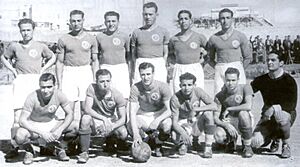
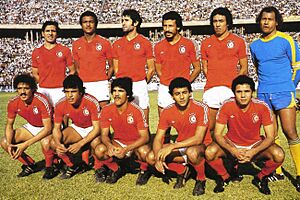
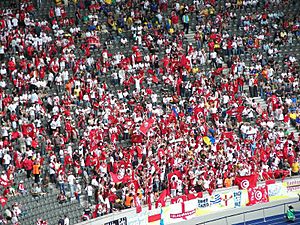
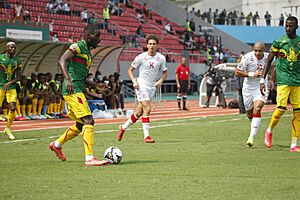
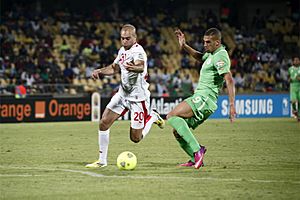
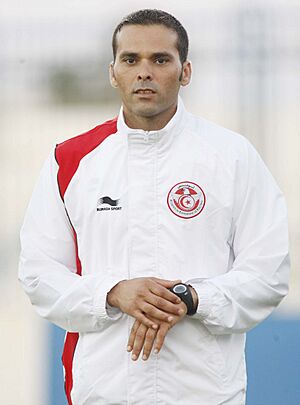
 In Spanish:
In Spanish: